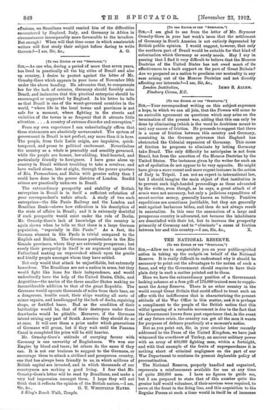LTO THR EDITOR or ran " SPNCTATOR.”.1 SIB,—As one who,
during a period of more than seven years, has lived in practically all the big cities of Brazil and also up country, 1 desire to protest against the letter of Mr. Ormsby-Gore which appears in your issue of November 16th under the above heading. He advocates that, to compensate her for the lack of colonies, Germany should forcibly seize Brazil, and insinuates that this piratical enterprise should be encouraged or supported by England. In his letter he tells us that Brazil is one of the worst-governed countries in the world, "where life in the local towns and provinces is not safe for a moment, where fighting in the streets and vicinities of the towns is so frequent that it attracts little attention. . . . A country of extreme disorder and corruption."
From my own experience I can unhesitatingly affirm that these statements are absolutely unwarranted. The system of government in Brazil is not perfect, any more than it is here. The people, from their Latin origin, are impulsive, quick- tempered, and prone to political excitement. Nevertheless the country as a whole is peaceably and sensibly governed, while the people are honest, law-abiding, kind-hearted, and particularly friendly to foreigners. I have gone alone up country in Brazil without troubling to take a revolver, and have walked alone, late at night, through the poorer quarters of Rio, Pernambuco, and Bahia with greater safety than I could have done in the poorer districts of London. Sordid crimes are practically unknown in Brazil.
The extraordinary prosperity and stability of British enterprises in Brazil is in itself a sufficient refutation of your correspondent's unfair attack. A study of two such enterprises—the Sflo Paulo Railway and the London and Brazilian Bank—shows how ridiculous is his description of the state of affairs in Brazil ; and it is extremely doubtful if such prosperity would exist under the rule of Berlin. Mr. Ormsby-Gore's lack of knowledge of the country is again shown when he tells us that there is a large German population, " especially in Salo Paulo." As a fact, the German element in Sao Paulo is trivial compared to the English and Italian. The Germans predominate in the Rio Grande provinces, where they are extremely prosperous ; but surely their prosperity in itself is an argument against the Fatherland making an unprovoked attack upon the gentle and kindly people amongst whom they have settled.
Not only would that attack be unjustifiable, but extremely hazardous. The Brazilians are not a nation in arms, but they would fight like lions for their independence, and would undoubtedly have the help of the United States, Chile, and Argentina—the navies of the three smaller States making no inconsiderable addition to that of the great Republic. The Germans would operate thousands of miles from their base, on a dangerous, hostile coast, their ships wanting all sorts of minor repairs, and handicapped by the lack of docks, repairing shops, or fortified bases. Bad as the condition of their battleships would be, that of their destroyers under those drawbacks would be pitiable. Moreover, if the Germans intend seizing any part of South America they should do so at once. It will cost them a price under which generations of Germans will groan, but if they wait until the Panama Canal is completed the price will be still heavier.
Mr. Ormsby-Gore's attitude of currying favour with Germany is one unworthy of Englishmen. We won our Empire by blood and tears ; let others do the same if they can. It is not our business to suggest to the Germans, or encourage them to attack a civilized and prosperous country, one that has always been friendly to us, in which millions of British capital are invested, and in which thousands of our countrymen are making a good living. I fear that Mr. Ormsby-Gore's letter will be read by Brazilians, and make a very bad impression amongst them. I hope they will not think that it reflects the opinion of the British nation.—I am,














































 Previous page
Previous page